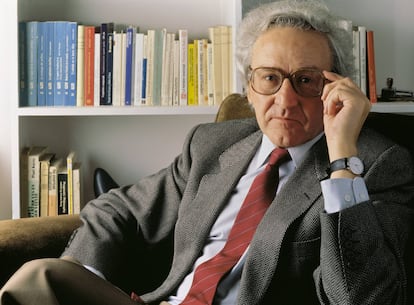In the Athenaeum of Madrid, in the opening ceremony of the celebrations of Spain in Libertad. 50 years, one of the attendees, very young compared to the average age, surprised the entire auditorium by launching his question: “What is democracy?” Probably, the best possible response can be found in the first article of the 1978 Constitution, which determines that “Spain is a social and democratic state of law.”
Thus, in the first place, our country is defined as a democratic state, because political dynamics is based on the existence of a party system, guarantee of the ideological pluralism of society. For their proper functioning, it is necessary that these parties are not considered as enemies, but as adversaries, so they regularly contrast their programs and proposals in free elections – recessed by universal suffrage -, all recognize the legitimacy of the rest to govern and accept , therefore, the peaceful alternation in power.
As a social state, secondly, since the right of all citizens is recognized, without discrimination of any kind, to enjoy conditions worthy of existence. In this regard, the Constitution emphasizes the right to housing (article 47), healthcare (article 43) and free and universal public education (article 27). All sustained by an articulated tax system around the “principles of equality and progressivity” (article 31).
And, in third and last place, although no less important, a rule of law, that is, the one in which every activity is under the empire of the law. But not any kind of law, but only those arising from A democratically chosen parliament, according to the conditions set forth above. And it is that “not every state is the rule of law; The existence of a legal order, of a system of legality, does not authorize to speak without more of the rule of law. Designate as such a state, by the simple fact that it uses a legal normative system, it constitutes a conceptual and real imprecision that only leads – sometimes intentionally – to confusion. ”
This constitutional definition of Spain is, to a large extent, the main legacy of one of our great jurists of the twentieth century, and also of the XXI, Professor Elías Díaz García, who died in Madrid last Monday, February 3, 2025, to the 90 years.
Born in Santiago de la Puebla (Salamanca), Elías Díaz owes a fundamental book, from which the previous quotation proceeds, to understand the political transition and learning of the language of coexistence by a whole generation: Rule of Law and Democratic Society. Published by Notebooks for dialogue in October 1966, there were several editions exhausted after overcoming the attempts of the Ministry of Information and Tourism to block its appearance, given the proximity to the referendum fake that the Francoist dictatorship was organizing to ratify the organic law of the State. Beyond this coincidence, nothing casual, it is a work that maintains intact all its validity, such as its notion that these three pillars, democratic, social and law, are inseparable, so that if one is at risk, They are all.
Far from limiting himself to the legal field, Elías Díaz quickly expanded his intellectual spectrum towards other disciplines, as highlighted in his study on The social philosophy of Spanish Krausism (1973), as well as another work of deep influence among historians of culture: Spanish thought in the era of Franco (1939-1975)written between 1969 and 1974 on the occasion of a timely stay at the University of Pittsburgh after a confinement period derived from his socialist militancy, a circumstance that he never considered incompatible with rigor due to academic analysis, as he himself reflected in Socialism in Spain: the party and the State (1982).
Always faithful to the title of one of his books, From the institution to the Constitution (Trotta, 2009), Elías Díaz was in addition a person of an extraordinary modesty and kindness. Refractory to all self -complacency, I never let the opportunity to listen to what they had to tell the new generations – ”the elderly we learn from those hateful young people”, as I said fun in an interview in the magazine Dock-, whose interpretations promoted and with whose doubts and difficulties was able to empathize. Until the view, old teacher, and continues to rebuild the reason wherever you are.

